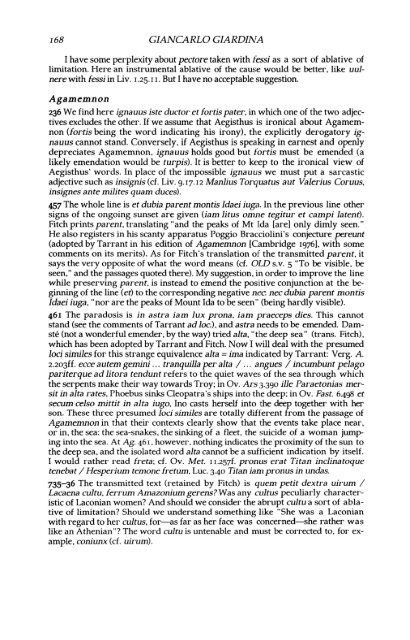MOUSEION - Memorial University of Newfoundland
MOUSEION - Memorial University of Newfoundland
MOUSEION - Memorial University of Newfoundland
You also want an ePaper? Increase the reach of your titles
YUMPU automatically turns print PDFs into web optimized ePapers that Google loves.
68 GIANCARLO GIARDINA<br />
I have some perplexity about pectore taken with Jessi as a sort <strong>of</strong> ablative <strong>of</strong><br />
limitation. Here an instrumental ablative <strong>of</strong> the cause would be better. like uulnerewith<br />
fessi in Liv. 1.25.11. But I have no acceptable suggestion.<br />
Agamemnon<br />
236 We find here ignauus iste ductor et fortis pater. in which one <strong>of</strong> the two adjectives<br />
excludes the other. If we assume that Aegisthus is ironical about Agamemnon<br />
(fortis being the word indicating his irony). the explicitly derogatory ignauus<br />
cannot stand. Conversely. if Aegisthus is speaking in earnest and openly<br />
depreciates Agamemnon. ignauus holds good but fortis must be emended (a<br />
likely emendation would be turpis). It is better to keep to the ironical view <strong>of</strong><br />
Aegisthus' words. In place <strong>of</strong> the impossible ignauus we must put a sarcastic<br />
adjective such as insignis(cf. Liv. 9.17.12 Manlius Torquatus aut Valerius Coruus.<br />
insignes ante milites quam duces).<br />
457 The whole line is et dubia parent montis Idaei iuga. In the previous line other<br />
signs <strong>of</strong> the ongoing sunset are given (jam litus omne tegitur et campi latent).<br />
Fitch prints parent. translating "and the peaks <strong>of</strong> Mt Ida [are] only dimly seen."<br />
He also registers in his scanty apparatus Poggio Bracciolini's conjecture pereunt<br />
(adopted by Tarrant in his edition <strong>of</strong> Agamemnon [Cambridge 1976]. with some<br />
comments on its merits). As for Fitch's translation <strong>of</strong> the transmitted parent. it<br />
says the very opposite <strong>of</strong> what the word means (d. OLD S.v. 5 "To be visible. be<br />
seen," and the passages quoted there). My suggestion. in order to improve the line<br />
while preserving parent. is instead to emend the positive conjunction at the beginning<br />
<strong>of</strong> the line (et) to the corresponding negative nee nee dubia parent montis<br />
Idaei iuga. "nor are the peaks <strong>of</strong> Mount Ida to be seen" (being hardly visible).<br />
461 The paradosis is in astra iam lux prona. iam praeceps dies. This cannot<br />
stand (see the comments <strong>of</strong> Tarrant ad loc). and astra needs to be emended. Damste<br />
(not a wonderful emender. by the way) tried alta. "the deep sea" (trans. Fitch).<br />
which has been adopted by Tarrant and Fitch. Now I will deal with the presumed<br />
loci similes for this strange equivalence alta =ima indicated by Tarrant: Verg. A.<br />
2.203ff. ecce autem gemini ... tranquilla per alta / ... angues / incumbunt pelago<br />
pariterque ad litora tendunt refers to the quiet waves <strong>of</strong> the sea through which<br />
the serpents make their way towards Troy: in Ov. Ars3.390 ille Paraetonias mersit<br />
in alta rates. Phoebus sinks Cleopatra's ships into the deep: in Ov. Fast. 6498 et<br />
secum celso mittit in alta iugo. Ina casts herself into the deep together with her<br />
son. These three presumed loci similes are totally different from the passage <strong>of</strong><br />
Agamemnon in that their contexts clearly show that the events take place near.<br />
or in. the sea: the sea-snakes. the sinking <strong>of</strong> a fleet. the suicide <strong>of</strong> a woman jumping<br />
into the sea. At Ag. 46 I. however. nothing indicates the proximity <strong>of</strong> the sun to<br />
the deep sea. and the isolated word alta cannot be a sufficient indication by itself.<br />
I would rather read freta: d. Ov. Met. II.257f. pronus erat Titan indinatoque<br />
tenebat / Hesperium temone fretum. Luc. 3.40 Titan iam pronus in undas.<br />
735-36 The transmitted text (retained by Fitch) is quem petit dextra uirum /<br />
Lacaena cultu. ferrum Amazonium gerens?Was any cultus peculiarly characteristic<br />
<strong>of</strong> Laconian women? And should we consider the abrupt cultu a sort <strong>of</strong> ablative<br />
<strong>of</strong> limitation? Should we understand something like "She was a Laconian<br />
with regard to her cultus. for-as far as her face was concerned-she rather was<br />
like an Athenian"? The word cultu is untenable and must be corrected to. for example.<br />
coniunx (d. uirum).

















